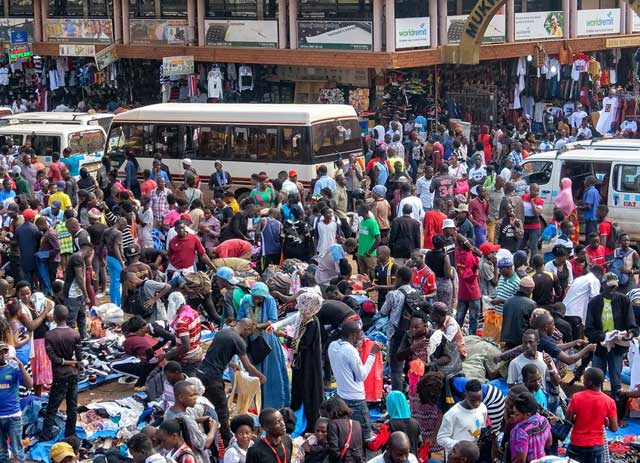
Kampala, Uganda | THE INDEPENDENT | As East Africa starts reporting cases of COVID 19, in many parts of Kampala, little is known about the disease.
With over 170,000 infected persons globally, Dr. Tedros Adhanom, the World Health Organsation (WHO) Director General says that the pandemic should be everyone’s concern because everyone has a part to play in stopping the spread of the disease.
Commonly referred to ‘Senyiga wa ba China’ loosely translated as Chinese flu or Colona few business people in downtown Kampala and parts of Kamwokya know what the disease is and how it is spread.
Majority of the people that URN interviewed did not know how it is spread and can be stopped or controlled. For some, the disease was a foreign idea that is likely to affect people of white skin.
Along William and Luwum Street, vendors selling roasted groundnuts, cigarettes, yellow bananas and mangoes did not know what the disease is. They intimated that they did not know why the level of hand washing around the city has increased.
Nightrose Nantumbwe, a yellow banana vendor at William street Kampala says that she hasn’t heard anything concerning COVID-19 and knows nothing about it. She says that she has seen several people wash their hands occasionally where she too was advised to wash but she literally had no idea as to why she washed her hands against her will though it was a onetime thing.
The knowledge of people involved in technology works like repairing phones is not any different. Abdul Kizito, a phone repairer at Mackay road in Kampala says he has heard about the disease but does not know much concerning it. Kizito also says that people down town try to follow the advice given to them by the leaders like avoiding shaking hands anyhow with their fellows and also they refer to the disease as “Colona”.
In Kamwokya, communities around the market and the police station are as green as those in downtown Kampala. Erias Kyakunzire, a bodaboda rider at Mawanda Road Police Stage says apart from hearing people refer to the disease as Chinese flue, he does not know anything about it.
Siraje Kabuye, a matooke seller in Kamwoka market says that knowledge about the disease is not important. “How can I know about something that I have not been told about. Us here we are living our normal lives. If there was need for worry, out leaders would have told us what to do,” he said.
In the new taxi park, it was business as usual. Here just like Nalongo Kiwanuka, many believe that the disease is airborne. Gadafi Kasanda, who sells stationary in the new taxi park says he has not yet understood the disease.
Those who had heard about the disease had wrong facts. Nalongo Kiwanuka, a shop attendant in Kamwokya says that it is only a matter of time before the disease is spread to everyone.
“I have heard people being told to wash their hands but me am just laughing at them because that will not help them. This disease is airbone. Even when you wash your hands, you will still fall sick if someone near you sneezes. The only thing that we can do is pray so that doctors can get medicine for it like ARVs for HIV because it being a viral disease has no cure,” said Nalongo.
Others even believe that the disease is a biological weapon that was created by Western powers to over throw the Chinese economy. One of such people is Ivan Ssenfuma, a safe boda rider. “Ehhh that thing is powerful. Those Americans are really very dangerous people. They wanted to eliminate their friends but instead have also been affected,” said Ssenfuma.
While Ugandans are following regional news and even know that Kenya has reported cases of COVID-19 many like Dennis Mutumba, a second hand shoe vendor at Mukwano Arcade says that they do not know what the disease is. Mutumba says that they need first to see a case of the disease within the country to get better understanding of the disease.
Globally, as of 5:00 pm on Mondfay , the number of infected persons stood at over 170,000. Over 90 percent of the reported cases are from China, Italy, Iran and Spain.
With Kenya, Rwanda, Tanzania and Somalia declaring cases, it is only a matter of time when Uganda will declare its first. But with little awareness of the ordinary Ugandan who works in a market or down town Kampala, officials from the World Health Organization say that countries like Uganda need to shift their preparedness plans from national level plans to different communities.
Dr Michael Ryan, the WHO Executive Director of Health Emergencies Program says that preparedness plans need to reach all people for better disease response results.
“One of the things that we found during the Ebola outbreak was that reproducing preparedness at sub-national level, district level it is another challenge that we need to address. Our work now is moving the preparedness activities from the national level down to the district level in all countries in Africa,” he said.
Dr Allan Muruta, the commissioner in charge of Public Health Emergencies in an earlier interview with URN said that lack of funds was likely to hinder the country’s preparedness plan.
“We asked for money but it has not yet been released. So far only 5 billion out of 25 billion that was requested for has been released. A big portion of the money was supposed to be used for public awareness,” he said.
*******
URN
 The Independent Uganda: You get the Truth we Pay the Price
The Independent Uganda: You get the Truth we Pay the Price


